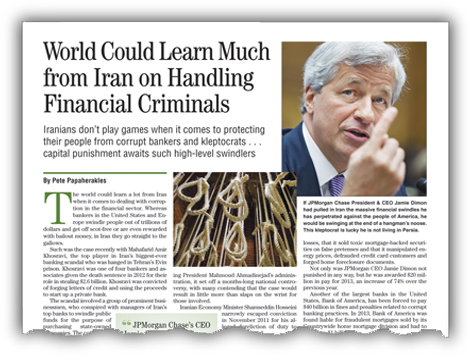
• Iranians don’t play games when it comes to protecting their people from corrupt bankers and kleptocrats . . . capital punishment awaits such high-level swindlers.
By Pete Papaherakles —
The world could learn a lot from Iran when it comes to dealing with corruption in the financial sector. Whereas bankers in the United States and Europe swindle people out of trillions of dollars and get off scot-free or are even rewarded with bailout money, in Iran they go straight to the gallows.
Such was the case recently with Mahafarid Amir Khosravi, the top player in Iran’s biggest-ever banking scandal who was hanged in Tehran’s Evin prison. Khosravi was one of four bankers and associates given the death sentence in 2012 for their role in stealing $2.6 billion. Khosravi was convicted of forging letters of credit and using the proceeds to start up a private bank.
The scandal involved a group of prominent businessmen, who conspired with managers of Iran’s top banks to swindle public funds for the purpose of purchasing state-owned companies. The co-conspirators included: Khosravi’s legal advisor, Behdad Behzadi; his financial solicitor, Iraj Shoja; and the head of the Ahvaz branch of Saderat Bank, Saeed Kiani Rezazadeh.
The former CEO of Iran’s Melli Bank, Mohammad Reza Khavari, who is one of the main suspects in the case, managed to escape and is still on the run. He’s wanted by Interpol.
The president of one of Melli Bank’s branches received a sentence of life imprisonment, and a former official involved in the embezzlement case was sentenced to 10 years in prison.
Other defendants were given sentences varying from flogging—another form of punishment the West could use—to paying cash fines and being barred from public office.
When the scandal broke in September 2011 during President Mahmoud Ahmadinejad’s administration, it set off a months-long national controversy, with many contending that the case would result in little more than slaps on the wrist for those involved.
Iranian Economy Minister Shamseddin Hosseini narrowly escaped conviction in November 2011 for his alleged dereliction of duty to pursue the fraud.
Although Khosravi was sentenced to death two years ago, plans for his execution had not been made public, and his death caught many observers of the scandal by surprise.
Human rights groups have criticized Iran’s use of the death penalty, saying that it is one of the world’s heaviest users of the punishment. But economists suggest that turning a blind eye to massive and pervasive financial fraud, as is seen in the U.S. and Europe, leads to distrust of banking institutions and the justice system, not to mention the demoralizing effects upon the citizenry.
As an example of this, JPMorgan Chase, the biggest U.S. bank, recently settled charges that it was an accomplice in Bernie Madoff’s $20-billion Ponzi scheme, that it filed false reports to conceal over $6 billion in derivatives losses, that it sold toxic mortgage-backed securities on false pretenses and that it manipulated energy prices, defrauded credit card customers and forged home foreclosure documents.
Not only was JPMorgan CEO Jamie Dimon not punished in any way, but he was awarded $20 million in pay for 2013, an increase of 74% over the previous year.
Another of the largest banks in the U.S., Bank of America (BOA), has been forced to pay $40 billion in fines and penalties related to corrupt banking practices. In 2013, BOA was found liable for fraudulent mortgages sold by its Countrywide home mortgage division and had to cough up $1 billion.
In that case, Countrywide was charged with cashing in on shoddy mortgages and then selling them to quasi-government agencies Fannie Mae and Freddie Mac for a nice profit.
The head of that unit, Rebecca S. Mairone, was found personally complicit for the role she played in the scandal, yet she is only expected to have to pay out $1.6 million in fines—a paltry sum compared to the millions Ms. Mairone made committing financial fraud.
If Ms. Mairone lived in Iran, it’s likely she would dangle by her pretty neck, but instead her lawyers fight on in court, pleading that this “single woman with two kids” can’t afford to pay the penalty and will have to cash in her 401(k).
Pete Papaherakles is a writer and political cartoonist for AFP and is also AFP’s outreach director. Pete is interested in getting AFP writers and editors on the podium at patriotic events. Call him at 202-544-5977 if you know of an event you think AFP should attend.


